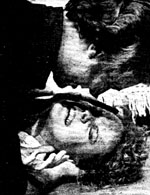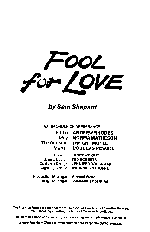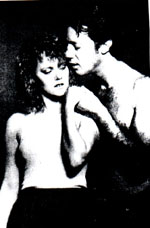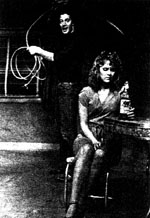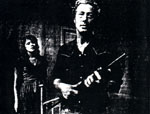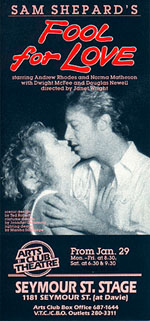Fool For Love
The Arts Club Theatre, 1986
A Tale of Passion in a Motel RoomThe press photos suggest that the Arts Club production of Fool For Love capitalized on the sexually-charged relationship between May and Eddie--half-sister and brother--in Shepard's 1983 play.In an interview with Norma Matheson, who played May to Andrew Rhodes' Eddie in the Arts Club production, I asked her about the promotion of the play and how it seemed to focus on the sexuality between the principals. There was certainly that emphasis, she said, though all the images suggested an air of danger as well. Matheson (now Norma Bowen) recalled that audiences were often disturbed by the play: the gradual discovery of the incestuous secret blasted any hope that the lovers might be reconciled. It was, she recalled, "right on the edge of what was acceptable at the time." The ambiguous ending of the play tended to separate the optimists in the audience--those who believed that May is able to break away from her obsessive-compulsive relationship--from the pessimists who believed that May and Eddie will continue in this disturbing cycle of attraction and repulsion. Despite its ability to disturb audiences, the play was well-received by Vancouver audiences: it was held over and sold out to the end. "We played longer than the movie," Bowen recalled. The Arts Club production may have benefitted from the timely promotion afforded by Robert Altman's 1985 movie, a movie which brought Sam Shepard the actor into the mainstream. Working on Fool For Love impressed on Bowen the "inner rhythms" of Shepard's writing. Rehearsals discovered this rhythm, in which, she claimed, "every space has to be filled. Once the rhythm is going, it's hard to stop. We had to learn not to change the rhythms of Shepard's writing, which is almost Shakespearean in that way. Use the words the way he's written them." What about his characters? "There's wisdom to his characters. Their intelligence doesn't come from book learning, but from life. They have a knowledge of life." It's this knowledge of life, according to Bowen, which makes Shepard's characters--even the really "unpleasant" ones--so likeable. When I suggested that they often wore their vulnerability on their sleeves, she agreed: "The audience has to look at what's important about another person. How do you change your perception of that person once you know their secret?" We discussed the oppressive fathers in many of Shepard's plays, including the Old Man in Fool For Love. "Father figures are important. Old men are tyrants to their children. Now that they're old, all they have is their words. They no longer have their physical power." That the Old Man in Fool For Love exists "only in the minds of May and Eddie," does not diminish his influence on them in the given circumstances. This coexistence of threat and vulnerability may account for the appeal--such as it is--of such characters as the Old Man, Baylor in a A Lie of the Mind, or Weston in Curse of the Starving Class. Like so many of Shepard's other characters, they must improvise a new way of being within their matrix of constraints. Rehearsals for Fool For Love involved "lots of physicalization," Bowen recalled. There was no improvisation of the text; unlike Schechner's Tooth of Crime, this production followed the script closely. Improvisation in rehearsals focused on physicalizing the action. While the actors did discuss the psychology of the characters, director Janet Wright chose to "tell the story as written, a story about a half-brother and sister." Despite a tendency by reviewers to suggest that the actors were "going heavy on the symbolism," their intention was to "let the symbolism sit there" as they told the story Shepard had written. We agreed that a bed sitting prominently centre stage carried sufficient symbolism on its own and needed little additional freight from the actors. We talked about how Shepard's characters are often "playing for stakes" and how this was equally true for actors in his plays. Bowen recalls how she attempted to "surrender to the words that are there....You don't need technical tricks to get into a Shepard character. He's a gift to actors."

|
